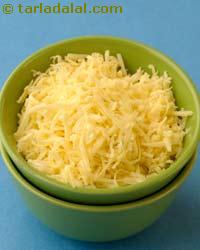![]()
Description
On a skewer, with olives, bell peppers, pineapple, onion and a wedge of lime, cheese cubes, make for a colourful pick-me-up at parties. Cheese cubes are made from cow, sheep, or goat's milk, or even, a combination of all three. Sometimes the taste varies from cube to cube. And that's simply because of the cheese's point of origin. Cow's milk is often described as earthy, sheep's milk on the other hand has a mild nutty, fruity flavour, while goat's milk is tangy and grassy. Chances are these very flavours are what make each cube variant different from each other.
Grated cheese cubes

Place the grater on a plate and grate the cheese cubes to get either finely grated or thickly grated cheese as per the recipe requirements.
How to Select
• There are many brands that make cheese cubes which are commercially available in many flavours.
• Make sure the cheese doesn't sport any mouldy spots or is discoloured in any way
• Packaging and best by dates are important so please check these details before buying.
• If you are particular about the source of your cheese, organic cheese is available at select gourmet stores.
Culinary Uses
• When paired with apples, pears and melons, or any fruit of your choice, it cuts through the sweetness and adds a creamy, dairy note to the flavour.
• Remember that cheese cubes are easier to grate, crumble and slice when refrigerated; if you want to mash or spread it, bring it to room temperature.
• Nuts, whether mixed, spiced, smoked, or plain, are a great textural counterpoint to a cheese plate.
• Cheesy soups, sauces or fondue, work well with cheese cubes due to their precise size and easy availability.
How to Store
• Cheese Cubes are best refrigerated in the compartment or crisper where the humidity prevents it from drying out.
• Always keep cheese cube protected in a sealed container or carefully wrap it in a wax paper covered by aluminium foil.
• Place these cubes in an airtight container hence away from strong-smelling foods, as they easily absorb odours.
• Proper storage prolongs the life of your cheese.
• Buy a little bit, and buy often. The home refrigerator is not a friendly environment for cheese; the less time it spends in there, the better.
Health Benefits
• Cheese is a naturally rich source of many nutrients including calcium, phosphorous, protein, fat soluble vitamins and B vitamins.